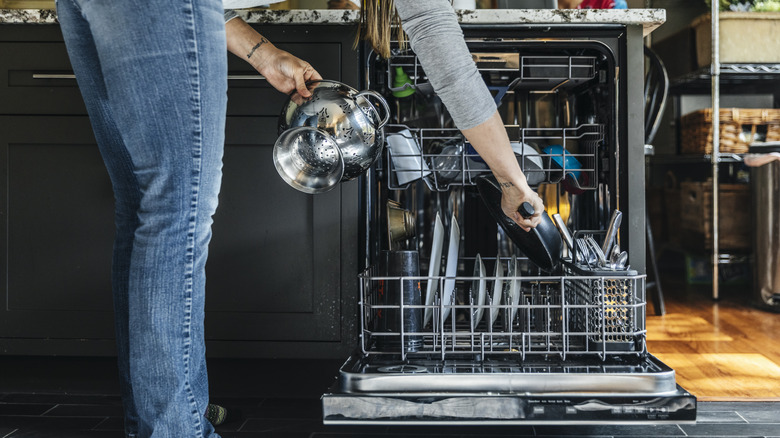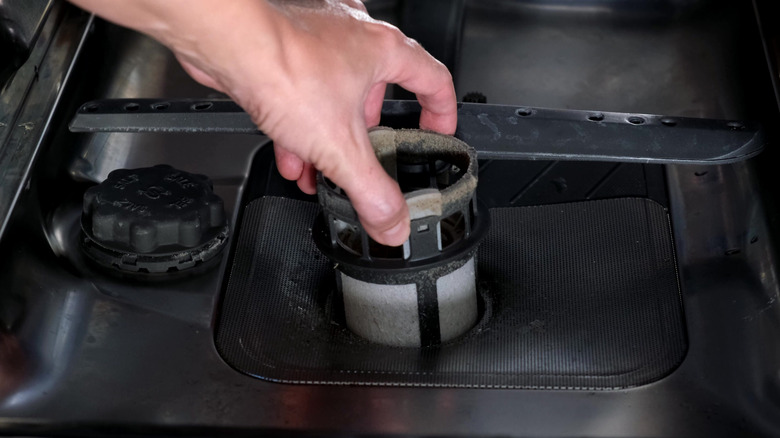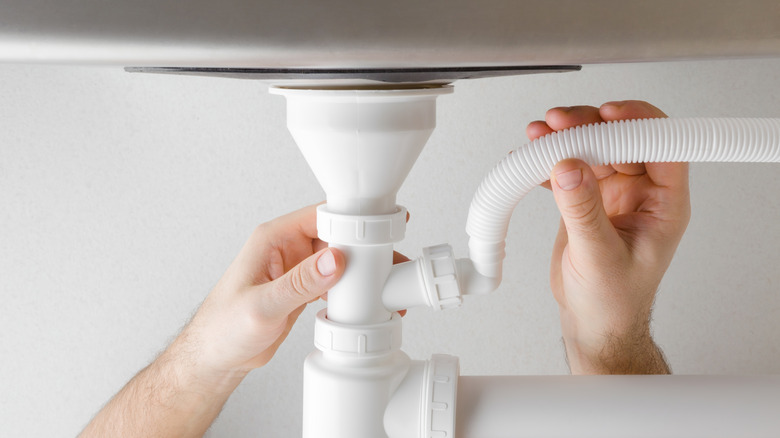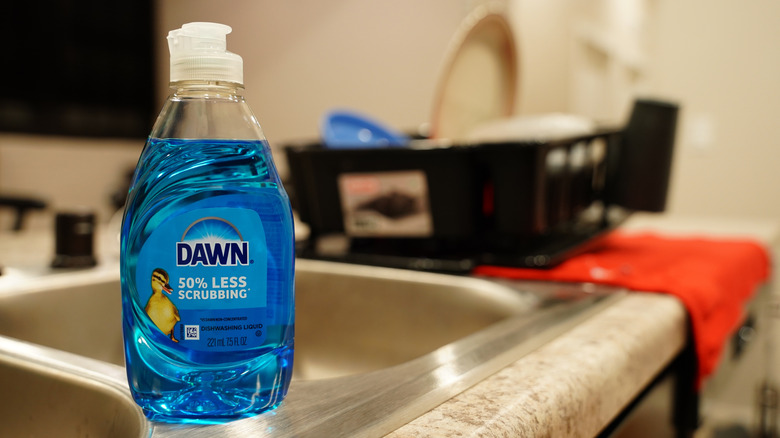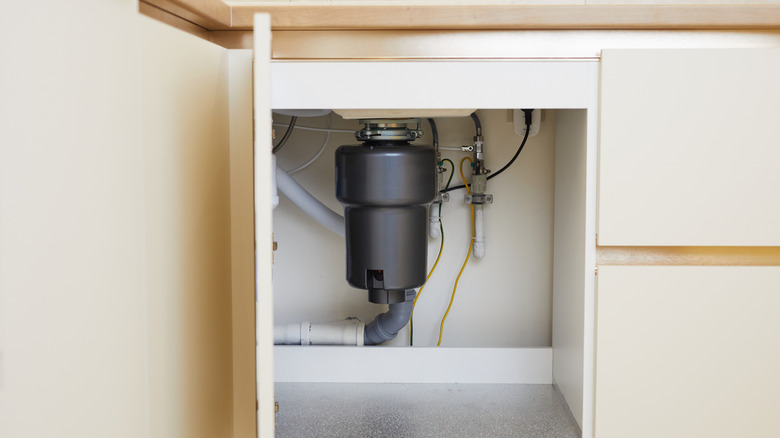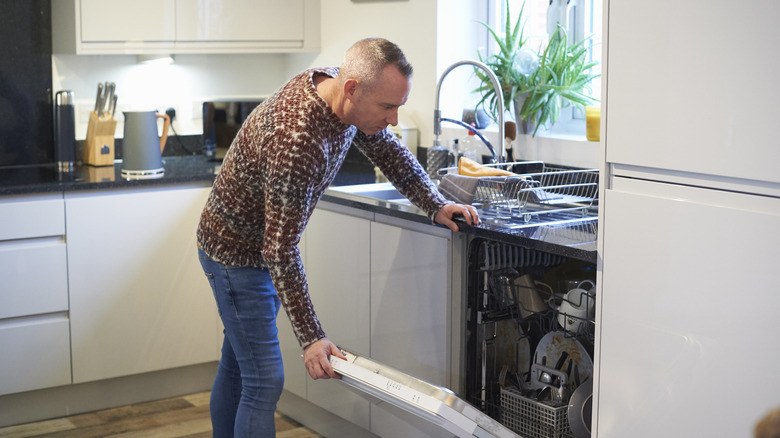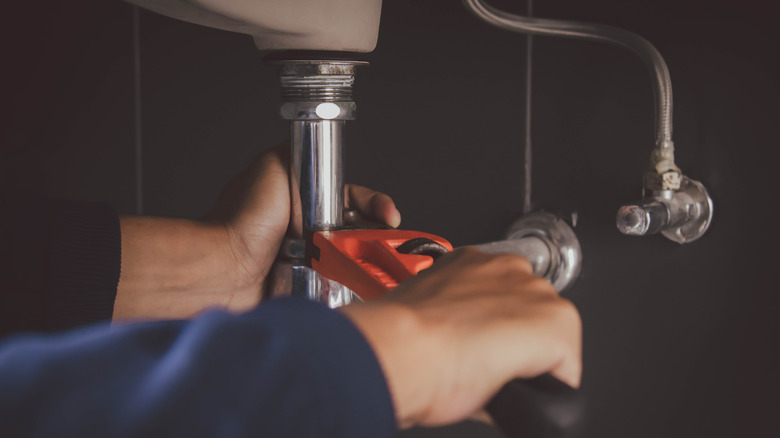Common Mistakes That Are Causing Your Dishwasher To Clog (& Tips To Prevent It)
A clogged dishwasher is no small inconvenience, especially in busy households where cooking and sharing meals are a big part of each day. Clogs may show subtle warning signs before they become a bigger issue. You may first notice that the dishes are still dirty after each cycle, or a small puddle of water forms beneath the machine every time it is used. Loud noises or gurgling pipes are also an indicator that something is up. However, the most common sign of a clog is standing water in your dishwasher, which is typically a result of faulty drainage.
Dishwashers have many components that are responsible for draining water from the machine, and all of them are susceptible to blockages. Other issues could be responsible for the clog in your dishwasher, too. It may be as simple as using the wrong detergent for your machine, or a bigger underlying problem such as damaged plumbing. Failing to address the root cause could be the reason why your dishwasher repeatedly gets clogged, and could lead to greater issues that are more challenging to repair. But there are many things you can do to identify the source of the clog and prevent it from recurring.
Clogged filter
One of the most common causes of dishwasher clogs is a blocked filter. The filter is responsible for trapping large particles to keep the pump clear, so the debris must be cleared periodically to allow the filter to work efficiently. If your dishes are not coming out clean after each cycle, this could be an early sign that your filter is clogged. As the clog worsens, it will prevent the water from draining into the pump, causing it to pool in your dishwasher instead.
Thankfully, cleaning the filter is easy to do. Locate it on your machine, typically beneath the bottom rack, removing the rack if necessary to access it. Twist and pull it out to remove it, rinse it with water and a soft brush if needed, then put it back. Your filter may need to be cleaned as frequently as once per month, depending how often you use your dishwasher.
Blocked or kinked drain hose
Dishwashers are complicated appliances with many essential parts. One is the drain hose, which connects your dishwasher to your sink plumbing or garbage disposal. Like the filter, the drain hose can also become clogged with food scraps, garbage, and sediment buildup. The hose itself may also become damaged from wear and tear, leading to kinks that interrupt the flow.
To clear or repair your drain hose, turn off the power and water to your dishwasher. Locate the hose with your dishwasher's manual, or by looking underneath your sink. Inspect it visually for any kinks or improper installation. Before disconnecting it, have a bucket or towel ready for excess water. You may be able to clear the debris without removing the hose entirely. Avoid using drain cleaner, as the abrasive chemicals could cause damage. When in doubt about how to fix your drain hose, reaching out to a plumber is the safest solution.
Using the wrong detergent
You may be causing your dishwasher to clog simply by using the wrong detergent for your machine. Using regular liquid dish soap in your machine could prevent it from draining properly as it produces too many suds, which is why most dishwashers require powder detergent. Powder detergent is also considered to be more eco-friendly and suitable for hard water. It is important to choose a detergent based on the guidelines in your dishwasher's manual to prevent unnecessary clogs.
If you suspect that this might be the root cause of your issue, the best way to unclog your dishwasher is by creating a mixture of equal parts baking soda and vinegar. Pour it into the drain at the bottom and let it sit for 15 minutes before rinsing with hot water. This will unblock the drain so you can use your dishwasher properly with the right detergent.
Garbage disposal blockage
If you have a built-in dishwasher that's connected to your garbage disposal, it runs the risk of becoming clogged. A garbage disposal that is backed up will prevent the overflow of water in your dishwasher from draining properly, which will inevitably cause a flood in the machine. Loud noises are a telltale sign that the issue is stemming from your garbage disposal.
The good news is that you may be able to unclog it simply by running the garbage disposal to break up leftover food particles stuck inside. If this doesn't work, the drain plug that connects your garbage disposal to the dishwasher may be to blame. Also known as the knockout plug, it must be removed for the dishwasher to drain properly. Knockout plug issues are most likely to occur if your dishwasher or garbage disposal was recently installed. If you can't locate and remove the plug on your own, call a professional for assistance.
Air gap issues
The air gap cylinder is another essential component of your dishwasher. Its primary function is to keep clean water circulating through your dishwasher and prevent dirty used water from becoming stuck inside the machine during a wash cycle. Much like the other parts of your dishwasher, it is susceptible to blockages that can prevent it from doing its job. While inspecting your machine for the cause of the clog, ensure that the air gap is clean, free of debris, and securely installed.
The good news here is that the air gap is easy to find; it is the cylindrical fitting that sits right on top of your sink next to the faucet. Inside this cylindrical cap is the drain hose. Remove the cap to access the hose and use a bottle-cleaning brush to clear the debris around the area until the opening is clear, which may be all it takes to get it running smoothly again.
Faulty plumbing system
A clogged dishwasher is just one of the many problems that can arise from aging or faulty plumbing. Pipes that are outdated and damaged can cause drainage issues throughout your home, leading to blockages or even wastewater backup into other fixtures, including toilets and bathtubs. Plumbing damage presents itself in a variety of ways, including a foul sewage odor, low water pressure, and discolored water. It could even be the reason why your toilet is gurgling. A clogged dishwasher could be the result of a blocked drain in your kitchen plumbing, especially if it's accompanied by other signs, like a slow-draining kitchen sink or gurgling sounds coming from the drains while your dishwasher is running.
If you suspect that faulty plumbing may be the cause of your clogged dishwasher, it's important to call a professional right away. Neglecting it may lead to more severe issues, such as mold and mildew in your walls.
